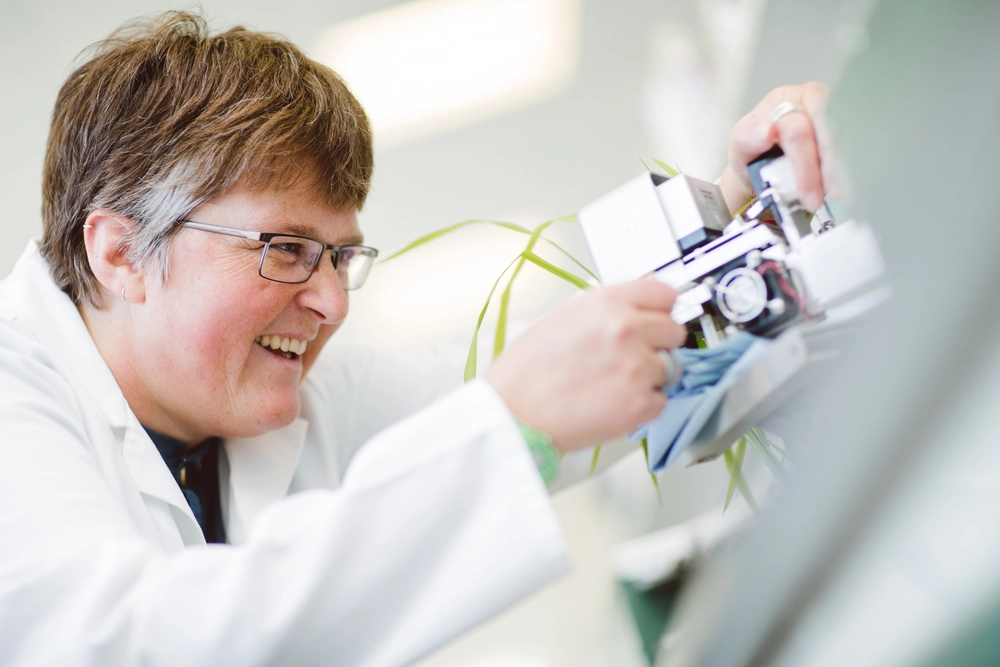
Growing up on an arable and livestock farm in Northumberland, the northernmost county in England, Tracy Lawson's childhood experience sparked a lifelong fascination with plants, setting the stage for her impressive career as a leading biologist.
Now, as a globally recognized expert in plant biology, Lawson has recently joined the plant biology faculty University of Illinois, where she is eager to share her innovative research and expertise. Inspired by her past experiences with the Realizing Increased Photosynthetic Efficiency (RIPE) project, she found Illinois to have a fantastic community and excellent facilities. Lawson looks forward to new discoveries, believes in taking advantage of new opportunities as they arise, and is excited to “do some cool science!”
In her first few years at Illinois, Lawson’s primary aim will be to continue her 30 years of research focusing on stomatal function to improve photosynthesis, water use efficiency, and crop productivity. While the transition from a large, long-running lab at the University of Essex, in the UK to a new research setting presents unique challenges, Lawson views it as an exciting chance to explore bold ideas and keep pushing the boundaries of plant science.
"There's always new questions to ask," she says.
Lawson said one of her goals is to dig deep into key questions related to stomatal function within various plant organs and different leaf surfaces, with the promise of manipulating these elements to enhance crop resilience. Additionally, Lawson said she hopes to better understand how stomata adjust to meet the plant’s need for carbon dioxide during photosynthesis. She leads RIPE’s efforts in improving stomatal conductance and focuses on stacking these traits with manipulating photosynthesis via Calvin cycle enzymes and is also involved in the physiological analysis of transgenic plants and has developed several new tools to facilitate such phenotyping. RIPE, which is led by Illinois, is engineering crops to be more productive by improving photosynthesis, the natural process all plants use to convert sunlight into energy and yields. RIPE is supported by Gates Agricultural Innovations (Gates Ag One).
Lawson also serves as director of the Alliance for Socially Acceptable & Actionable Plants (ASAP), which just secured major funding through the U.S. National Science Foundation's Global Centers competition. The project brings together an international team with the goal of advancing bioeconomy research to solve global challenges.
Lawson earned her bachelor's degree in applied biology at Liverpool John Moores University and later completed her doctorate in Plant Physiology at the University of Dundee in Scotland. Recognized as a highly cited researcher but Clarivate for the past five years, she has consistently ranked in the top 1% of cited researchers during the past decade. In 2023, she won a Royal Society Leverhulme Trust Senior Research Fellowship. In 2024, she was named on the Best Plant Science and Agronomy Scientist list in the United Kingdom by research.com.
Throughout her remarkable career, Lawson has sustained her motivation and her passion for science, appreciating that “no two days are alike.” Each day brings in fresh challenges and opportunities. She is driven by a constant stream of questions and the excitement of discovering new knowledge.
Reflecting on her more than 26 years at Essex, she places value on the teamwork she developed within the group. Working within a close-knit team, and learning to harness each other’s strengths, led to exciting developments and innovative approaches to address real-world challenges.
“The University of Essex has been an amazing place to build my career over the last 26 years, through invaluable collaborations between colleagues and industrial partners, which lead to some exciting science,” Lawson said. “Without the dedication of my past and present lab members, none of my research advancements would have been possible.”
Lawson said she finds it essential to embrace being a "we," not an "I" person, highlighting the importance of collaboration. Her vision is to build a similarly collaborative environment here in Illinois. With new team members who align with her values.
In a broader sense, Lawson looks forward to collaborating with her colleagues and trying out the new facilities and resources that were not available in the UK— especially the ability to run more field trials and see her research have a real-world impact.
“I am extremely excited to work with the amazing colleagues (both old and new) at the University of Illinois who have the same passion for science and in some cases for stomata (Andrew) and can’t wait to get started in my brand-new lab.”